Royal Caribbean Group Bundle
What Drives Royal Caribbean Group's Success?
Understanding a company's core principles is key to evaluating its potential. Royal Caribbean Group (RCG), a leader in the cruise industry, relies on a strong foundation of mission, vision, and core values to guide its operations and strategic decisions.
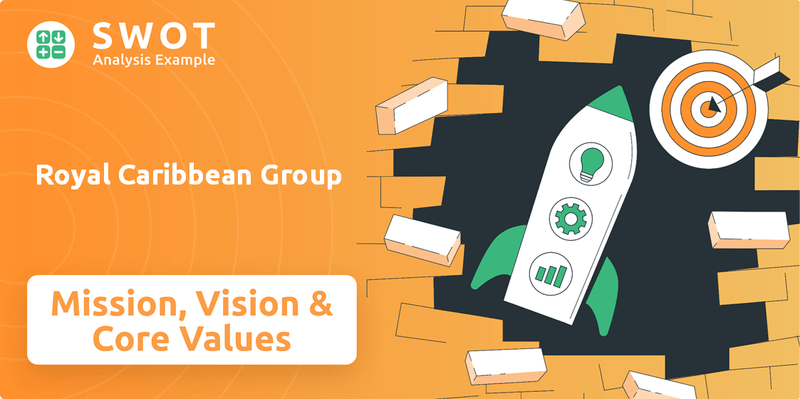
These elements are not just statements; they are the driving forces behind Royal Caribbean's commitment to delivering exceptional experiences and achieving long-term growth. Delving into the Royal Caribbean Group SWOT Analysis further illuminates how these principles are applied in practice. This exploration offers valuable insights for investors, analysts, and anyone interested in understanding the strategic underpinnings of this industry giant. Understanding the Royal Caribbean Mission, Royal Caribbean Vision, and Royal Caribbean Core Values is crucial.
Key Takeaways
- Royal Caribbean's mission, vision, and core values are foundational to its business strategy.
- Strong financial performance, including record bookings and projected earnings growth in 2025, reflects the impact of these principles.
- Innovation and responsible tourism are key to navigating industry challenges and maintaining leadership.
- Sustainability and positive community impact are crucial for long-term success in the cruise industry.
Mission: What is Royal Caribbean Group Mission Statement?
Royal Caribbean Group's mission is 'to deliver the best vacations responsibly.'
Let's delve into the heart of Royal Caribbean Group (RCG) and unpack its mission statement. Understanding the Royal Caribbean Mission is crucial for investors, analysts, and anyone interested in the cruise industry. This statement acts as a compass, guiding the company's strategic decisions and operational focus.
The mission statement, "to deliver the best vacations responsibly," is concise yet powerful. It encapsulates both the 'what' and the 'how' of RCG's business. It's about providing exceptional vacation experiences and doing so with a strong sense of accountability.
RCG's mission caters to a diverse customer base. Its brands like Royal Caribbean International, Celebrity Cruises, and Silversea Cruises, each target different segments, from families to luxury travelers. This wide reach ensures the company can weather market fluctuations and cater to evolving consumer preferences.
The core product is cruise vacations. RCG offers a wide array of itineraries across the globe, from the Caribbean to Alaska and beyond. The company continuously innovates in ship design and onboard experiences to maintain its competitive edge.
The unique value proposition lies in delivering 'the best vacations' and doing so 'responsibly.' This dual focus distinguishes RCG. It's not just about fun and relaxation; it's about ethical operations and environmental stewardship.
The mission is reflected in RCG's operations. This includes continuous innovation in ship design and onboard amenities, exemplified by the Icon of the Seas, and the expansion of unique destinations like Perfect Day at CocoCay. Furthermore, the commitment to 'responsibly' is evident in significant investments in sustainability initiatives, such as waste management technologies and the Destination Net Zero strategy, with a goal to achieve net-zero emissions by 2050.
The mission is strongly customer-centric, aiming to exceed guest expectations. This is evident in the company's focus on providing diverse experiences and personalized services. RCG's commitment to customer satisfaction is a key driver of its success. In 2023, Royal Caribbean International reported a guest satisfaction score of 88%, reflecting the success of this approach.
The mission statement, therefore, serves as a cornerstone for Royal Caribbean Group's strategic direction. It’s a statement that guides not only the guest experience but also the company's broader impact. For a deeper dive into how RCG approaches its marketing efforts to achieve its mission, explore the Marketing Strategy of Royal Caribbean Group.
Royal Caribbean Group SWOT Analysis
- Complete SWOT Breakdown
- Fully Customizable
- Editable in Excel & Word
- Professional Formatting
- Investor-Ready Format
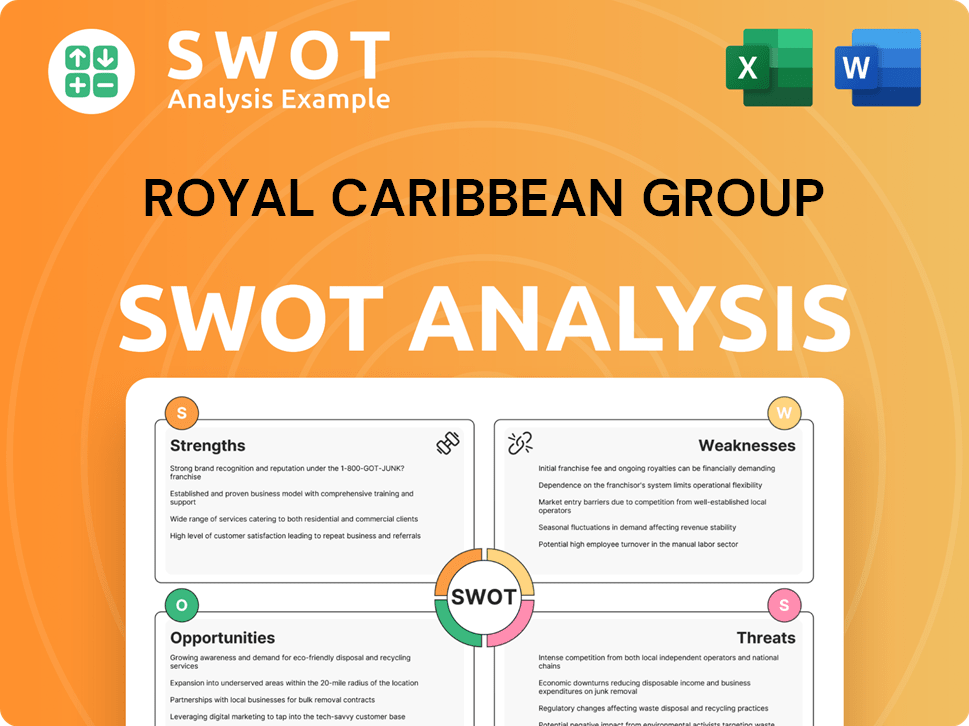
Vision: What is Royal Caribbean Group Vision Statement?
Royal Caribbean Group's vision is "to be the most innovative and sought-after cruise vacation company in the world."
Let's delve into the significance of this forward-looking statement and its implications for the company's future. This vision statement encapsulates Royal Caribbean's ambition to lead the cruise industry through innovation and desirability, setting a high bar for guest experiences and operational excellence.
The vision explicitly targets market leadership. Royal Caribbean Group (RCG) aims not just to be a cruise line but the most innovative and desirable, signaling a commitment to continuous improvement and customer satisfaction.
Innovation is central to Royal Caribbean's vision. This means consistently introducing new technologies, ship designs, entertainment options, and onboard experiences to captivate guests and differentiate itself from competitors. This focus on innovation is a key element of the Growth Strategy of Royal Caribbean Group.
The vision emphasizes creating "unforgettable experiences." This underscores RCG's commitment to exceeding guest expectations, from pre-cruise planning to onboard activities and post-cruise follow-up. This is a crucial part of the Royal Caribbean Vision.
While not explicitly stated in the vision statement itself, Royal Caribbean's commitment to sustainability, safety, and responsible growth is implied. This reflects an understanding of the importance of environmental stewardship and ethical business practices within the cruise industry. This is a part of Royal Caribbean Core Values.
Royal Caribbean's financial performance supports its vision. With an expected adjusted earnings growth of 23% in 2025, the company is well-positioned to invest in innovation, expand its fleet, and enhance guest experiences. This robust financial health is crucial for achieving the Royal Caribbean Mission.
The vision implicitly supports the company's global expansion strategy. Royal Caribbean Group aims to be a leader worldwide, increasing its presence in key markets and offering diverse itineraries to attract a broad customer base. The Royal Caribbean Group (RCG) is always looking to expand.
In summary, Royal Caribbean's vision is a bold statement of intent, driving the company's strategic direction and shaping its future in the cruise industry. It is a comprehensive plan focusing on innovation, guest satisfaction, and responsible growth, all underpinned by a strong financial foundation. Understanding this vision is crucial for anyone seeking to understand Royal Caribbean's strategic direction and future prospects.
Royal Caribbean Group PESTLE Analysis
- Covers All 6 PESTLE Categories
- No Research Needed – Save Hours of Work
- Built by Experts, Trusted by Consultants
- Instant Download, Ready to Use
- 100% Editable, Fully Customizable
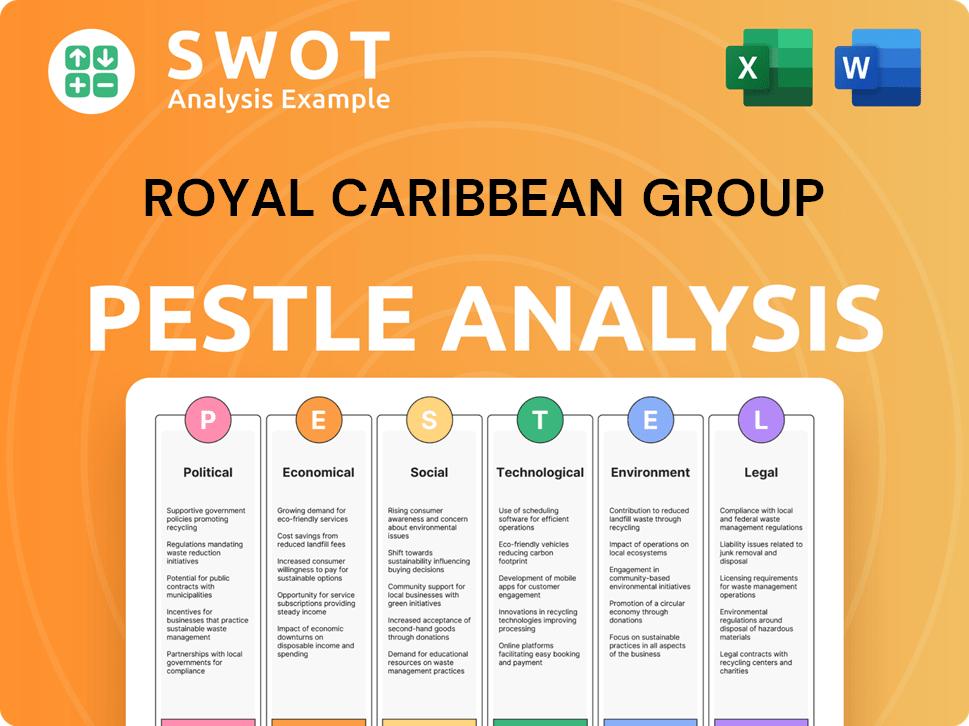
Values: What is Royal Caribbean Group Core Values Statement?
Understanding the core values of Royal Caribbean Group (RCG) is crucial to grasping its operational philosophy and its impact on the cruise industry. These values are the bedrock upon which Royal Caribbean Group builds its culture, guides its decisions, and shapes its interactions with guests, employees, and stakeholders.
This core value emphasizes the importance of prioritizing the well-being and experience of everyone involved with Royal Caribbean Group, including employees, guests, and partners. This commitment is reflected in the company's efforts to create inclusive and welcoming environments on its ships, as well as its dedication to fostering a diverse and respectful workplace. For example, Royal Caribbean has invested over $1 billion in its Healthy Sail Panel, demonstrating its commitment to passenger and crew health and safety, a direct reflection of putting people first.
This value underscores the importance of collaboration, teamwork, and a relentless pursuit of high standards. Royal Caribbean Group fosters a culture of continuous improvement and innovation, encouraging employees to work together to deliver exceptional experiences. This is evident in the company's ongoing investment in its fleet, with new ships like Icon of the Seas pushing the boundaries of cruise ship design and amenities, showcasing a commitment to excellence and innovation.
This core value highlights Royal Caribbean Group's commitment to innovation, sustainability, and making a positive impact on the world. The company actively seeks to challenge the status quo and introduce groundbreaking technologies and practices that benefit its stakeholders. This is reflected in its sustainability initiatives, such as its commitment to reducing carbon emissions and investing in renewable energy sources, with the goal of achieving net-zero emissions by 2050.
Integrity is the foundation of Royal Caribbean Group's operations, guiding all business practices with honesty, ethical conduct, and accountability. This value ensures that the company operates with transparency and builds trust with its stakeholders. This commitment to ethical conduct is crucial for maintaining the company's reputation and ensuring its long-term success, as highlighted in the company's annual reports and sustainability disclosures.
These Royal Caribbean Core Values collectively shape the company's identity, fostering a guest-focused, innovative, and responsible culture. Understanding these values provides a deeper insight into how Royal Caribbean Group operates and makes decisions. To further understand how these values translate into strategic action, explore how the company's mission and vision influence its strategic decisions. For more information about the financial performance and ownership structure of Royal Caribbean Group, you can refer to Owners & Shareholders of Royal Caribbean Group.
How Mission & Vision Influence Royal Caribbean Group Business?
Royal Caribbean Group's (RCG) mission and vision are not just aspirational statements; they are the cornerstones upon which the company builds its strategic decisions. These statements directly shape its investments, operational priorities, and overall approach to the cruise industry.
The Royal Caribbean Mission to deliver the best vacations responsibly is a primary driver of strategic choices. This commitment is visible in several key areas:
- Fleet Expansion and Innovation: The launch of the Icon of the Seas and the upcoming Star of the Seas and Celebrity Xcel in 2025 exemplify the mission to provide innovative and sought-after vacation experiences. These ships are designed to attract a diverse range of guests.
- Private Destination Development: Royal Caribbean Group invests in unique private destinations, enhancing the guest experience and providing exclusive vacation options.
- Sustainability Initiatives: The "SEA the Future" initiative, reflecting the mission of responsible operations, guides efforts to reduce environmental impact. The company aims to reduce carbon intensity by 15% by 2025 and achieve net-zero emissions by 2050.
- Financial Performance: The strong financial results in 2024, including a load factor of 108% in Q4, and increased Net Yields, validate the success of strategies aligned with the mission and vision. This demonstrates high demand for Royal Caribbean's offerings.
The Royal Caribbean Vision to be the most innovative and sought-after company fuels continuous improvement and investment in new technologies and practices. This vision ensures the company remains at the forefront of the cruise industry.
Leadership consistently emphasizes the importance of the mission and vision. CEO Jason Liberty's statements highlight the company's dedication to delivering exceptional vacation experiences and maximizing shareholder returns.
The vision of being sought-after influences Royal Caribbean's competitive positioning. The company aims to compete with premium land-based resorts by offering unique, "Instagrammable" vacation activities.
The "SEA the Future" initiative is a direct manifestation of the company's Company Values, influencing strategic priorities such as reducing carbon intensity and achieving net-zero emissions. This commitment to sustainability is increasingly important to both investors and consumers.
Royal Caribbean Group's mission, vision, and values shape its impact on the cruise industry. The company's focus on innovation, sustainability, and guest experience sets industry standards and influences the strategies of competitors.
Understanding the target market is crucial for Royal Caribbean Group's success. For a deeper dive into the specific demographics and preferences that Royal Caribbean Group caters to, you can explore the Target Market of Royal Caribbean Group.
In conclusion, Royal Caribbean Group's Royal Caribbean Mission, Royal Caribbean Vision, and Royal Caribbean Core Values are not merely statements; they are the driving forces behind its strategic decisions, influencing everything from fleet expansion to sustainability initiatives. The company's commitment to these principles has led to strong financial performance and a leading position in the cruise industry. Now, let's delve into the next chapter to examine the core improvements to the company's mission and vision.
Royal Caribbean Group Business Model Canvas
- Complete 9-Block Business Model Canvas
- Effortlessly Communicate Your Business Strategy
- Investor-Ready BMC Format
- 100% Editable and Customizable
- Clear and Structured Layout
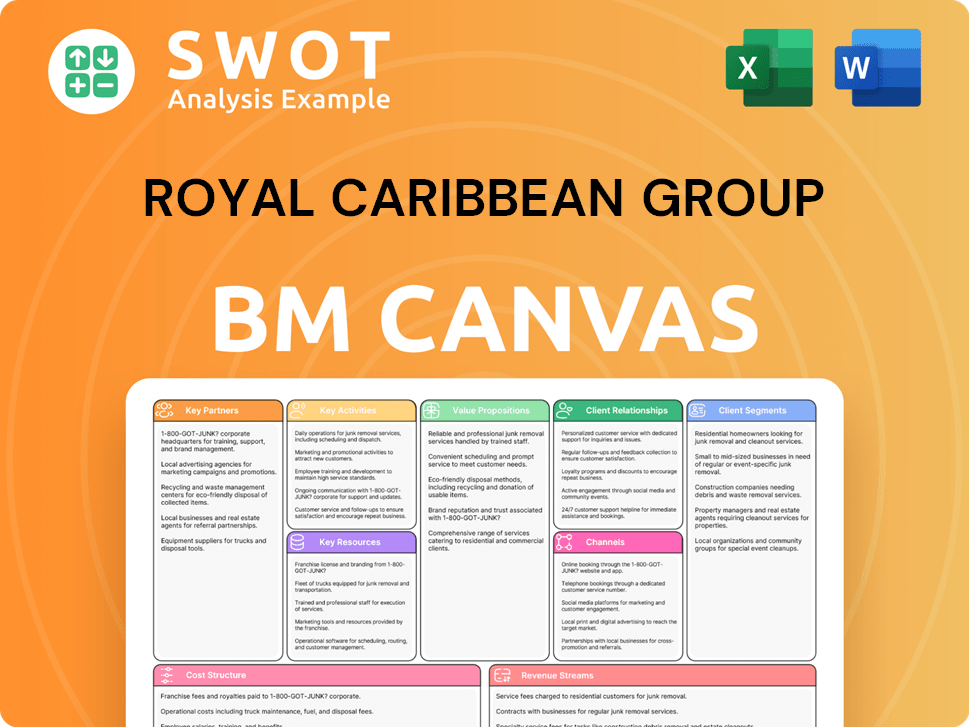
What Are Mission & Vision Improvements?
While Royal Caribbean Group (RCG) has established a strong foundation with its mission, vision, and core values, continuous improvement is crucial in a dynamic industry. This section explores opportunities to refine these guiding principles, ensuring they remain relevant and impactful for the future of Royal Caribbean.
Integrating a more explicit commitment to Diversity, Equity, and Inclusion (DEI) directly into the Royal Caribbean mission or vision statement would strengthen its importance. This could involve specific language about fostering an inclusive environment for guests and employees, reflecting evolving societal expectations. This aligns with the growing emphasis on DEI, as evidenced by the fact that companies with strong DEI practices often experience higher employee satisfaction and better financial performance.
Royal Caribbean Group can enhance its commitment to sustainability by articulating its role in promoting sustainable tourism within the destinations it visits. This can be achieved by setting more specific targets for supporting local economies, preserving cultural heritage, and reducing environmental impact. For example, the company could aim to increase its sourcing of local products by a certain percentage or invest a specific amount in community development projects. The cruise industry is under increasing pressure to address its environmental footprint, with stakeholders demanding greater transparency and accountability.
The Royal Caribbean mission and vision could benefit from incorporating language that addresses digital transformation and providing seamless, technology-enhanced guest experiences. This could involve a focus on leveraging technology to personalize guest interactions, streamline operations, and enhance overall satisfaction. The cruise industry is rapidly evolving, with digital technologies playing a crucial role in attracting and retaining customers; according to recent reports, the adoption of digital tools in the travel sector has increased by 30% in the last year.
While Royal Caribbean Group already focuses on sustainability, further emphasizing circular economy principles and setting more aggressive short-term targets could strengthen its commitment. This could involve specific goals for waste reduction, water conservation, and the use of renewable energy sources. The company's commitment to environmental stewardship is crucial for long-term success, especially given the increasing consumer demand for sustainable travel options. Further insights into the financial aspects of Royal Caribbean Group can be found in this article: Revenue Streams & Business Model of Royal Caribbean Group.
How Does Royal Caribbean Group Implement Corporate Strategy?
Implementing the Royal Caribbean Group's (RCG) mission, vision, and core values is crucial for translating strategic intent into tangible outcomes. This involves aligning operational practices, resource allocation, and corporate culture to reflect the company's guiding principles.
Royal Caribbean Group demonstrates its commitment to its mission and vision through strategic investments and innovative initiatives. This includes the development of new ships and destinations that reflect the company's values.
- Icon of the Seas: The launch of the Icon of the Seas, incorporating advanced waste-to-energy systems, exemplifies RCG's dedication to delivering exceptional vacations responsibly and driving innovation. This ship represents a significant step towards more sustainable operations, directly reflecting the company's mission.
- Perfect Day at CocoCay and Royal Beach Club Collection: The expansion of private destinations like Perfect Day at CocoCay and the planned Royal Beach Club collection showcases RCG's strategy to offer unique and sought-after experiences. These destinations are designed to provide guests with memorable vacations, aligning with the company's vision of creating extraordinary experiences.
- Investment in Technology: RCG continues to invest heavily in technology to improve the guest experience and operational efficiency. This includes advancements in areas such as onboard entertainment, digital services, and data analytics, all aimed at enhancing the overall vacation experience.
- Sustainable Practices: The company is actively working on reducing its environmental impact through various initiatives, including waste management programs, energy-efficient technologies, and partnerships with environmental organizations. These efforts demonstrate RCG's commitment to responsible operations and sustainability.
Leadership plays a vital role in reinforcing the company’s mission, vision, and core values. Effective communication ensures that these principles are understood and embraced throughout the organization.
CEO Jason Liberty frequently emphasizes the company's dedication to delivering the best vacations responsibly and driving shareholder value. This consistent messaging helps align the organization around these key principles.
The Royal Caribbean Mission, vision, and values are communicated to stakeholders through official statements, investor relations materials, and sustainability reports. This transparency builds trust and reinforces the company's commitment.
RCG fosters a culture where employees understand and embody the company's values. This is achieved through training programs, internal communications, and recognition initiatives, ensuring that employees are aligned with the company's goals.
Royal Caribbean Group ensures that its actions consistently reflect its stated values. This alignment is critical for maintaining credibility and achieving long-term success. The core values of Royal Caribbean Group are integrated into all aspects of the business.
- 'Save the Waves' Program: This program exemplifies RCG's commitment to environmental responsibility through waste management and other sustainability efforts.
- Partnerships with Organizations: Collaborations with organizations like the WWF to protect ocean health demonstrate a commitment to environmental stewardship. These partnerships help RCG achieve its sustainability goals.
- Perfecta Program: The 'Perfecta Program,' a three-year financial initiative, aligns business goals with strategic priorities and drives performance. This program ensures that financial objectives support the company's mission and vision.
- Sustainability Reporting: RCG publishes detailed sustainability reports that outline its environmental and social performance. These reports provide transparency and accountability, showcasing the company's progress toward its goals.
- Ethical Guidelines: RCG has established ethical guidelines that govern its operations. These guidelines ensure that the company conducts business with integrity and in accordance with its values.
The implementation of RCG's mission, vision, and core values is directly linked to its financial performance and strategic objectives. The company's focus on innovation, sustainability, and guest experience contributes to its long-term success.
RCG uses various KPIs to measure its success in implementing its mission and vision. These KPIs include guest satisfaction, environmental impact metrics, and financial results. The company closely monitors these metrics to ensure it is on track to achieve its goals.
RCG's long-term strategy is focused on sustainable growth and creating value for shareholders. This includes investing in new ships, expanding its destinations, and improving its operational efficiency. To learn more about the company's history and development, consider reading a Brief History of Royal Caribbean Group.
Royal Caribbean Group Porter's Five Forces Analysis
- Covers All 5 Competitive Forces in Detail
- Structured for Consultants, Students, and Founders
- 100% Editable in Microsoft Word & Excel
- Instant Digital Download – Use Immediately
- Compatible with Mac & PC – Fully Unlocked
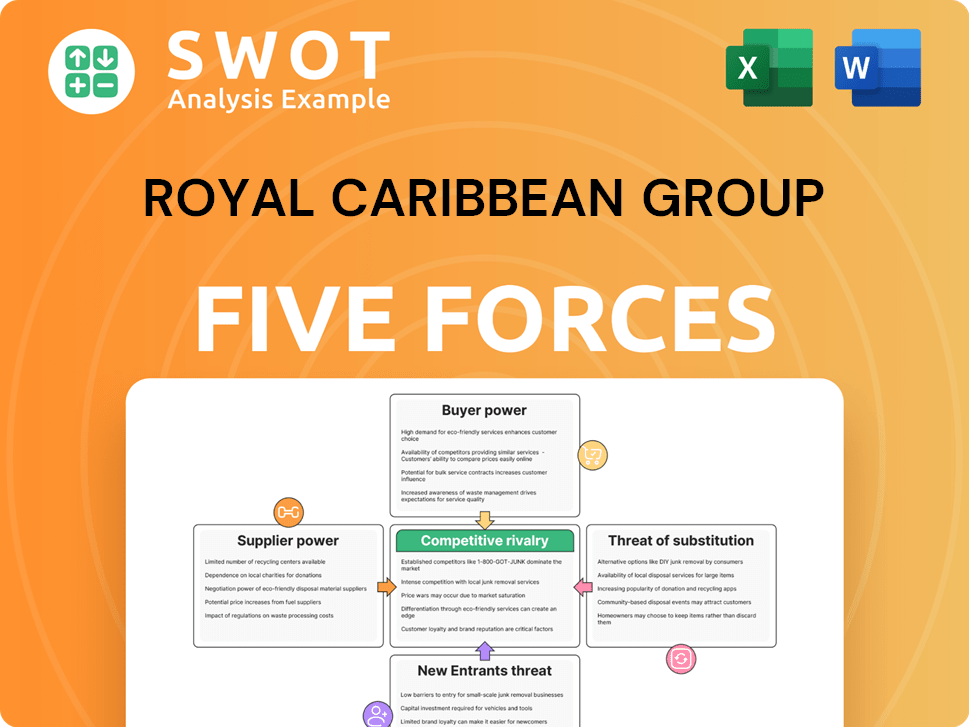
Related Blogs
- What are Mission Vision & Core Values of Royal Caribbean Group Company?
- What is Competitive Landscape of Royal Caribbean Group Company?
- What is Growth Strategy and Future Prospects of Royal Caribbean Group Company?
- How Does Royal Caribbean Group Company Work?
- What is Sales and Marketing Strategy of Royal Caribbean Group Company?
- Who Owns Royal Caribbean Group Company?
- What is Customer Demographics and Target Market of Royal Caribbean Group Company?
Disclaimer
All information, articles, and product details provided on this website are for general informational and educational purposes only. We do not claim any ownership over, nor do we intend to infringe upon, any trademarks, copyrights, logos, brand names, or other intellectual property mentioned or depicted on this site. Such intellectual property remains the property of its respective owners, and any references here are made solely for identification or informational purposes, without implying any affiliation, endorsement, or partnership.
We make no representations or warranties, express or implied, regarding the accuracy, completeness, or suitability of any content or products presented. Nothing on this website should be construed as legal, tax, investment, financial, medical, or other professional advice. In addition, no part of this site—including articles or product references—constitutes a solicitation, recommendation, endorsement, advertisement, or offer to buy or sell any securities, franchises, or other financial instruments, particularly in jurisdictions where such activity would be unlawful.
All content is of a general nature and may not address the specific circumstances of any individual or entity. It is not a substitute for professional advice or services. Any actions you take based on the information provided here are strictly at your own risk. You accept full responsibility for any decisions or outcomes arising from your use of this website and agree to release us from any liability in connection with your use of, or reliance upon, the content or products found herein.